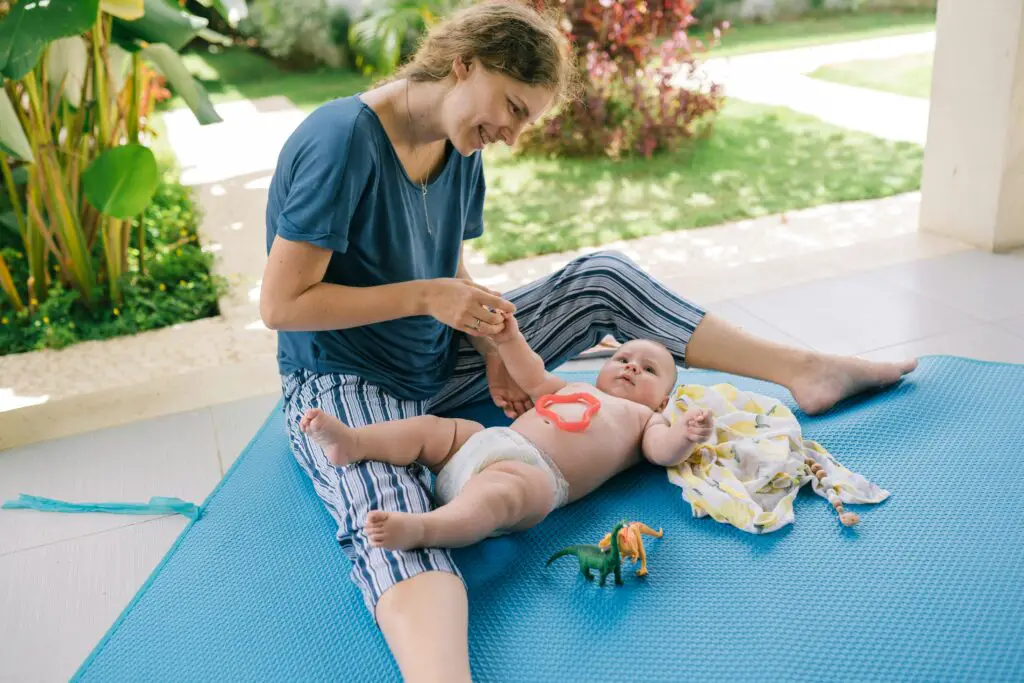If a new parent, you might wonder how important exercise is for your infant. It makes sense to want to give your child the most excellent possible care and development possibilities. We’ll discuss the topic of baby exercise in this post, covering its advantages, safety issues, and valuable advice for introducing exercise into your baby’s daily routine.

Importance of Physical Activity for Infants
In addition to helping with digestion and circulation, exercise is necessary for a newborn’s overall development. While they may not be lifting weights or running laps, simple movements and gentle exercises enable them to develop muscle strength, flexibility, and coordination.
Safety Considerations for Exercising Newborns
Prioritizing safety is essential before starting any particular exercise. Newborns should never exercise alone because of their fragile bodies and still-developing muscles. Before beginning any fitness program, always seek advice from your pediatrician. Also, pay attention to how your child responds and comfort levels when engaging in activities.
Types of Exercises for Newborns:
Tummy Time
For newborns, tummy time is an essential exercise that develops head control and neck strength. Throughout the day, put your baby on its stomach for small intervals; as it becomes stronger, slowly increase the time.
Gentle Stretches
For babies, gentle stretching activities can help increase flexibility and reduce stiffness. Stretch arms and legs gently; avoid stress gestures.
Baby Yoga
Infant-specific poses and motions are incorporated into baby yoga. It encourages ease of mind, adaptability, and sensory awareness. Take advantage of infant yoga courses designed for newborns or watch parenting videos.
Baby Massage
Babies benefit from massages for their physical development in addition to being calming. It is possible to strengthen the link between a parent and kid, ease gas and constipation, and enhance circulation with gentle rubbing and massaging techniques.

Benefits of Exercise for Newborns:
Enhances Muscle Development
Frequent exercise helps babies build solid and healthy muscles, which lays the groundwork for later motor abilities and mobility.
Aids Digestion and Bowel Movement
Engaging in physical exercise helps to stimulate the digestive tract, which in turn helps to relieve constipation and encourage regular bowel movements in babies.
Promotes Better Sleep Patterns
Regular exercisers’ babies frequently have longer, better-quality sleep, which makes for more peaceful evenings for both parents and babies.
Facilitates Bonding Between Caregiver and Baby
Exercise routines give parents or caretakers and their newborns meaningful opportunities to bond and build a sense of comfort and connection.
Neurological development
A baby’s brain and nervous system can be stimulated by specific activities, which can help with cognitive development and sensory integration. Activities that promote interaction, movement, and gentle touch can help a baby’s nervous system develop.
When to Start and How Often:
Even while it’s typically advised that parents start slight exercise as soon as the baby is born, they should follow the advice of their pediatrician, particularly if the child has any medical issues. It’s a good idea to start with short, frequent sessions and then progressively increase the time and intensity as the infant gains strength.
Recommended Age to Begin Exercises
Most pediatricians advise introducing moderate activities, including tummy time, soon after delivery. But always heed your physician’s advice, particularly if your child has any health issues or developmental delays.
Frequency and Duration of Sessions
When your baby gains strength, progressively increase the time of exercises from short periods throughout the day. Pay attention to your infant’s cues and avoid overstimulating or overtiredness.
Safety Measures for Exercising Newborns
Consulting with a Pediatrician:
Consult your pediatrician before starting any fitness program with your infant to ensure it’s safe and suitable for their age and health.
Using Appropriate Equipment and Props
Ensure any props or equipment in your baby’s workout routine are safe, strong, and free of any hazards that could choke them.
Being Mindful of Signs of Discomfort or Distress
Pay attention to your baby’s cues during activities, such as crying, fussiness, or color changes. If your infant exhibits any signs of discomfort or distress, stop what you’re doing right away.
Tips for Making Exercise Fun for Babies:
Incorporating Music and Songs
Babies can enjoy exercising more when they hear music. Sing calming tunes or play relaxing music as you do activities together.
Using Colorful Toys and Mats
Using bright and colorful toys, mats, and ornaments can make exercise more interesting and exciting for your kid.

Engaging in Interactive Play During Exercises
During exercise sessions, engage your kid in conversation, smiles, and eye contact. This improves the experience for your child as well as strengthens your relationship.
Make it a Playful Routine.
Incorporate exercise into everyday routines like bath time or changing diapers to make it enjoyable. When exercise is paired with a baby’s established routine, it makes them feel more secure and at peace.
Explore Outdoor Options
Make the most of outdoor areas for physical activity by playing in the backyard or taking leisurely walks in the park. The baby benefits from sensory stimulation and an enhanced exercise experience in fresh air and natural settings.
Water Fun
For babies, water play may be very entertaining and highly stimulating to their senses. Take your child to a parent-baby swim lesson or teach them to enjoy making big splashes in the bathtub. Water safety should always come first, and you should never leave your infant alone near water.

Socializing with Other Babies
Participating in mommy-and-me groups or infant exercise programs offers interaction and socialization opportunities. Set up playdates where the babies can interact physically with one another.
Common Mistakes to Avoid
Overexerting the Baby
Please don’t force your infant to move or push them over their comfort zone. Give them the freedom to advance at their speed while appreciating their unique skills and comfort zones.
Ignoring Cues of Fatigue or Discomfort
When exercising, always pay close attention to your baby’s cues. Try a different activity or take a break if they seem tired or uncomfortable.
Neglecting Proper Support During Exercises
Ensure your infant has adequate assistance when exercising, mainly during head and neck control activities like tummy time.
Conclusion:
Finally, it should be noted that exposing newborns to sufficient activity is essential to their general development and health. Infants can improve motor skills, muscle strength, and cognitive ability through tummy time, moderate movements, and sensory stimulation. These activities also help to strengthen the link between babysitters and their charges, creating a loving atmosphere ideal for growth. It’s crucial to remember that every infant is different. Therefore, activities should be customized to meet their specific requirements. By integrating these activities into their daily schedules, parents and caregivers can facilitate their newborns’ healthy physical and cognitive development.
